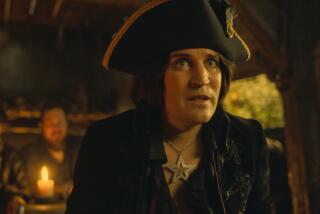Harold Fielding, 86; British Theatrical Producer
- Share via
Harold Fielding, one of Britain’s foremost theatrical producers whose credits include the London-originated hits “Half a Sixpence” and “Charlie Girl,” as well as Broadway imports such as “Mame” and “Sweet Charity,” has died. He was 86.
Fielding, who had suffered a series of strokes five years ago, died Sept. 27 in a nursing home in Kingston upon Thames, England.
Affectionately known in London theater circles as “The Guvnor,” Fielding produced more than 35 musicals during his more than three decades as one of the most powerful figures in British theater.
He had his greatest success with “Charlie Girl,” a lavish musical that debuted in 1965 and ran for more than five years.
He also staged London productions of “The Music Man” (1961), “Sweet Charity” (1967), “You’re a Good Man, Charlie Brown” (1968), “Mame” (1969), “Show Boat” (1971), “Barnum” (1981) and others.
Fielding was known for his often extravagantly staged productions -- his epic, yet unsuccessful, version of “Gone With the Wind” featured a spectacular burning of Atlanta.
Unlike most producers, Fielding invested his own money in his productions. And to help ensure a healthy box office, the onetime concert promoter earned a reputation for ingenious publicity stunts.
When Ginger Rogers arrived in England by ship to play “Mame,” she was welcomed in Southampton by a full orchestra playing songs from the musical and traveled to London on a special train filled with reporters. Arriving in London, the actress was taken to her hotel in a horse-drawn open carriage.
“I’m called a good marketeer,” Fielding said in a 1977 interview. “But I’m much more proud to be known as a showman.”
The son of a stockbroker, Fielding was born in Woking, England, and educated privately.
At age 10, he took up the violin, studied in Paris with Joseph Szigeti, and was good enough to go on tour billed as “England’s boy wonder violinist.” But he quit when the stress of performing caused him to forget notes on stage.
In the early 1940s, Fielding began producing tours for musical stars, and at one point he managed Sir Thomas Beecham and the Royal Philharmonic.
In 1945, he introduced a series of Sunday concerts at the Opera House in Blackpool, which lasted for more than 30 years. Among the headliners there were Frank Sinatra, Judy Garland and Danny Kaye.
In the early 1950s, Fielding’s touring concert series, “Music for the Millions,” included a young Julie Andrews as a regular featured performer. He also produced summer shows at seaside resorts until 1963 and, in 1957, helped arrange Count Basie’s first British tour.
Fielding moved into theater production in 1958 with a stage version of Rodgers and Hammerstein’s “Cinderella,” which had been written for U.S. television. The London production co-starred rock performer Tommy Steele, who later starred in “Half a Sixpence” and other Fielding productions.
A small, energetic man, Fielding prided himself on knowing what would appeal to audiences.
“I’ve always thought the public was the arbiter,” Fielding said in a 1984 interview after critics blasted his stage adaptation of “Singin’ in the Rain,” which became a big hit starring Steele. Fielding said he was a “great believer in spectacle.”
Fielding also had his share of flops, most famously “Ziegfeld,” a musical biography of the legendary American showman, in 1988.
He described it as “the most spectacular show I’ve ever produced.”
He put $4 million of his own money into the $5.5-million production. So confident was he that it would be successful that he took out a five-year lease on the London Palladium.
A critic for the London Times called “Ziegfeld” a “remarkable stylistic achievement.” But most reviewers panned it, one calling it “expensive nothingness” and another saying it was “a sad litany of disconnected items.”
Vowing to continue “the biggest gamble in Britain’s show business history,” Fielding replaced Len Cariou in the title role with Israeli actor Topol, brought in a new director -- Steele -- and extensively reworked the show.
But “Ziegfeld” closed after seven months, earning a reputation as one of the most expensive failures in theater history.
“Someone Like You,” a 1990 Civil War musical starring Petula Clark, was an even bigger disaster for Fielding. It closed after only five weeks and resulted in the voluntary liquidation of Fielding’s company.
Colleagues and rivals alike reportedly greeted news of “The Guvnor’s” bankruptcy with sadness.
Stage star Michael Crawford, who worked with Fielding on “Barnum,” described him this week as “the last of the great impresarios.”
“If anyone lived to bring color into people’s lives,” Crawford told the British press, “it was Harold Fielding.”
Fielding’s wife, Maisie, died in 1985. They had no children.
More to Read
The biggest entertainment stories
Get our big stories about Hollywood, film, television, music, arts, culture and more right in your inbox as soon as they publish.
You may occasionally receive promotional content from the Los Angeles Times.










